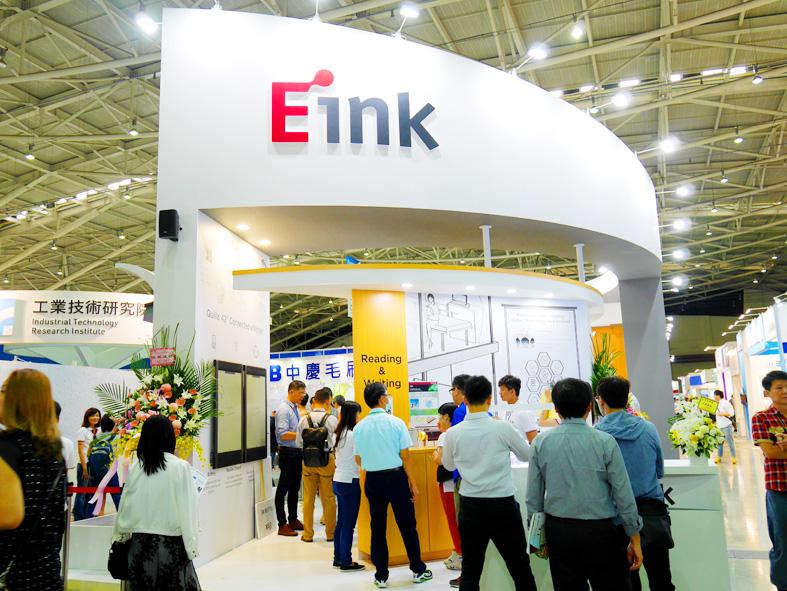E Ink Holdings Inc (元太科技) yesterday announced capacity expansion projects in Taiwan and China, as the world’s biggest e-paper display supplier aims to boost production of e-paper materials and flexible films.
The company plans to invest NT$3.31 billion (US$110.4 million) in Taoyuan’s Guanyin District (觀音) and 3.25 million yuan (US$479,400) at its Chinese facilities in Yangzhou, Jiangsu Province, it said.
The Hsinchu-based firm said its manufacturing capacity continues to be tight and it is unable to fully satisfy customer demand.

Photo: Chen Mei-ying, Taipei Times
Through 2024, the company plans to spend between NT$5 billion and NT$6 billion each year to fund those projects, it said.
“We are relatively positive about our business outlook,” E Ink chairman Johnson Lee (李政昊) told an online investors’ conference. “With more capacity coming online, we expect the third quarter would be better than the second quarter. The fourth quarter would also be better than the third.”
The anticipated sequential growth in revenue and net profit in the second half of the year comes as the world’s major retailers quicken pace in installing electronic shelf labels (ESLs), offsetting weakening demand for e-reader and e-note products, E Ink said.
Although consumers have turned cautious about spending on consumer electronics, including e-readers and e-notes, in the second half of the year, ESL demand remains strong, Lee said.
The shipments of e-reader modules could be 10 percent lower than E Ink’s estimates for this year, but they would still grow over last year, the company said.
More retailers are adopting ESLs rather than paper price tags to adjust prices automatically, Lee said, adding that ESL replacement demand remained strong.
“The ESL market is entering an organic growth phase. We believe it is still in an early stage of growth,” he said.
E Ink expects the penetration rate of ESLs to surpass 10 percent this year, compared with about 5 percent in the past few years.
The market could reach 30 billion or 40 billion units based on some customers’ calculations, he said.
E Ink posted a record-high net profit of NT$2.37 billion for last quarter, surging 71 percent from NT$1.39 billion a year earlier.
The company said it has seen a significant annual growth in e-reader shipments in the first half of this year.
The company’s first-half net profit expanded 50 percent year-on-year to NT$3.84 billion from NT$2.56 billion, while earnings per share rose to NT$3.36 from NT$2.26 a year earlier.

South Korea’s equity benchmark yesterday crossed a new milestone just a month after surpassing the once-unthinkable 5,000 mark as surging global memory demand powers the country’s biggest chipmakers. The KOSPI advanced as much as 2.6 percent to a record 6,123, with Samsung Electronics Co and SK Hynix Inc each gaining more than 2 percent. With the benchmark now up 45 percent this year, South Korea’s stock market capitalization has also moved past France’s, following last month’s overtaking of Germany’s. Long overlooked by foreign funds, despite being undervalued, South Korean stocks have now emerged as clear winners in the global market. The so-called “artificial intelligence

NEW IDENTITY: Known for its software, India has expanded into hardware, with its semiconductor industry growing from US$38bn in 2023 to US$45bn to US$50bn India on Saturday inaugurated its first semiconductor assembly and test facility, a milestone in the government’s push to reduce dependence on foreign chipmakers and stake a claim in a sector dominated by China. Indian Prime Minister Narendra Modi opened US firm Micron Technology Inc’s semiconductor assembly, test and packaging unit in his home state of Gujarat, hailing the “dawn of a new era” for India’s technology ambitions. “When young Indians look back in the future, they will see this decade as the turning point in our tech future,” Modi told the event, which was broadcast on his YouTube channel. The plant would convert

‘SEISMIC SHIFT’: The researcher forecast there would be about 1.1 billion mobile shipments this year, down from 1.26 billion the prior year and erasing years of gains The global smartphone market is expected to contract 12.9 percent this year due to the unprecedented memorychip shortage, marking “a crisis like no other,” researcher International Data Corp (IDC) said. The new forecast, a dramatic revision down from earlier estimates, gives the latest accounting of the ongoing memory crunch that is affecting every corner of the electronics industry. The demand for advanced memory to power artificial intelligence (AI) tasks has drained global supply until well into next year and jeopardizes the business model of many smartphone makers. IDC forecast about 1.1 billion mobile shipments this year, down from 1.26 billion the prior

People stand in a Pokemon store in Tokyo on Thursday. One of the world highest-grossing franchises is celebrated its 30th anniversary yesterday.